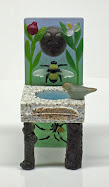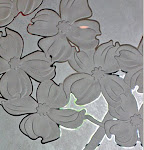Late with my summer reading list, only 5 books this quarter. I guess you can tell it was nose to the grindstone to finish the box and streaming shows in the hot afternoons. In fact, I'm pretty sure I didn't finish the last one until earlier this month so it really shouldn't be on this list at all.
The Magicians by Lev Grossman – Let me start out by saying I did not like this book but I plugged on til it was finished hoping that it would eventually redeem itself. It did not. I think it must be a young adult book as the main character was 17 at the beginning who keeps waiting for the 'magic' of life to happen when he will be happy and satisfied with who he is and his life. Also it heavily rips off the Narnia series and to a much lesser extent, Harry Potter in that there is a university of magic called Brakebills that has a secret passage to get to it. The Narnia rip off is a series of books the characters all read as children about a magical land that four children get to through a grandfather clock instead of a wardrobe, there's the Watcherwoman instead of the White Witch, two rams instead of the lion, the children become the queens and kings, and instead of Narnia, this Land is called Fillory (what a stupid name). The first part of the book is about their years at Brakebills and the second part is about their frivolous lives afterwards partying and partying and partying until they discover a way to actually get to Fillory where they go on a quest for the crown so they can be kings and queens, fight monsters, barely escape with their lives. Really, if you come across this book, don't bother.
The End Of The Day by Claire North – same author as The First Fifteen Lives Of Harry August from last quarter and also on the kindle. I liked the first book I read by her so I read this one which took me freaking forever to finish. Not because it was a struggle to get through but for some reason I just didn't have sit down and read time. Charlie has a new job, he's the Harbinger of Death. The Home Office updates his calendar with appointments and whatever gift he is told to bring to the person. He travels all over the world bringing things like a jug of maple syrup or a pen or chocolates or honey or a shovel or or or. Charlie comes sometimes as a courtesy, sometimes as a warning. He listens to their stories. Charlie likes his job, thinks it is important to bear witness to the lives of the people he is sent to. Death doesn't come just for people, sometimes he/she/it (as everyone sees Death differently) comes for an idea or a world that is ending. There's a lot of rumination and some passages sent me off on ruminations of my own. Because Charlie travels so much it is hard for him to have a personal life and sometimes doing his job he is met with violence, people who want to bargain with Death, kidnapped more than once, people think he has control when he has none, and it all starts to take a toll on him. There are also short passages where we see not only what Death is up to but War and Famine and Pestilence, all with Harbingers of their own. There are also short chapters that consist of unfinished sentences or thoughts, one after the other that have no connection to each other. I never did figure out what those were all about. Towards the end I just skimmed through those. I liked it well enough but it's pretty cerebral.
Transcription by Kate Atkinson – back to the library. They didn't have the book of hers I went for so I selected this one. In 1940, Juliet Armstrong, 18 and fresh out of school is recruited by MI5 to assist in an undercover operation to identify and keep tabs on the 'fifth column', those British who supported Hitler and were attempting to gather intel prior to his invasion of England. While they think they are reporting to a Gestapo agent, they are actually reporting to Godfrey, an MI5 agent, and it's Juliet's job to transcribe the recorded conversations. Her boss decides to use Juliet in a different undercover operation giving her an identity and background and introducing her to the fascist sympathizers. Ten years later, Juliet is working for the BBC producing films for the education department when she starts seeing people from her past work during the war and an anonymous note is delivered to her, “You'll pay for what you've done”, and Juliet sets out to investigate who it might be behind it. In the meantime, she is still being used occasionally by agents who call on her to provide a particular service. I won't reveal the end, the surprising little twist. It's a good story but the paragraphs of the transcribed conversations during the war got a little tedious.
Nightwork by Nora Roberts – A novel in three parts in one book, typical Nora Roberts, good story well told with beautiful people, Nora never disappoints when you want something lighthearted. Harry aka Booth is 9 when his mother gets cancer the first time and he learns to pick pockets to help with all the bills. He helps his eccentric aunt who came to live with them and care for his sister and his mom in the house cleaning business they have. He's 12 when he breaks into his first house for a memorable experience. He's 17 when his mother finally succumbs and he and his aunt go off in different directions to find their new lives and promise to stay close, a promise well kept. This is the story of the young cat burglar who had to leave his just found love and disappear for a decade to escape the wealthy powerful LaPorte, a man determined to own Booth and his extraordinary skills by hook or crook. When Booth settles down his path crosses with Miranda, the girl left behind and just as they settle in, LaPorte finds him to steal the Red Goddess, the largest purest reddest red rough diamond in the world. Here's the point where the inside cover would say “What will our hero do?”.
Station Eleven by Emily St. John Mandel – I watched the mini-series on HBO Max and really liked it so decided to read the book it's based on. Now having read the book, I'd have to say the series is very loosely based on the book. Giant liberties are taken. Same scene, the aftermath of a deadly flu that kills 99% of the world's population in a matter of weeks. Both the series and the book start in the middle of winter with the actor Arthur Leander having a heart attack on stage in NYC and dying. Jeevan, training to be a paramedic, runs up from the audience and gives CPR until a doctor takes over. Jeevan has a short conversation with 7 year old Kirsten, child actor waiting in the wings, until her 'wrangler' comes and fetches her. As Jeevan is heading home he gets a call from his friend in the ER telling him to leave the city, everyone is dying, or at least stock up on food and barricade himself in. Jeevan heads to his brother's apartment with 7 carts of food and they lock themselves in. In a matter of days everyone is dead or dying, in a matter of weeks there is no electricity. The characters, Kirsten, Jeevan, Miriam whose life project was the graphic novel Station Eleven and who dies on a beach in Singapore, and Clark are all connected to Arthur in one way or another and we get their stories, before and after the apocalypse, as the novel moves back and forth through time, as the survivors try to survive. Twenty years later finds Kirsten with the Traveling Symphony, a group of musicians and actors that travel from one small settlement to another in this new world giving concerts and staging Shakespeare; Clark has helped build a community at an airport where they were all stranded, and Jeevan has made his way to another community where he settled down. As I said the series takes big liberties with the book, inventing a relationship between Kirsten and Jeevan, inventing more of Jeevan's story when they get separated, and leaving Clark out almost completely (as I recall). The book is excellent, the series is excellent, but even when the series follows the book, it invents things. If you watch the series you'll just have to look at it as the series fleshing out the book.










Any thing by Kate Atkinson is great. I loved Transcription, full of cultural references and allusions. I'm glad you read it. Also Station ll, which I read on Steve Reed's recommendation, was excellent but I didn't want to go on to more of it! Thanks for the book notes.
ReplyDeleteI am not familiar with the books, but these are first rate reviews. Well done!
ReplyDeleteI loved "Station Eleven," though I haven't seen the series, and I always like Kate Atkinson though I haven't read that one.
ReplyDeleteWell I've already ready two of these (the Nora one & Station Eleven). I'll check out the Atkinson one - she's such a good writer!
ReplyDeleteI got hooked on Station 11, the series, as I somehow cannot get into sci-fi books. I enjoyed it, especially the episode where all the babies were born. And the soundtrack. This summer, I've read an awful lot of Australian crime by Jane Harper. I can recommend her. Esp. the first of her novels, The Dry, which is also a good movie.
ReplyDeleteThat part of the series isn't in the book at all as well as Jeevan and Kirstin leaving the theater together and hiding out in Frank's apartment and the year during that winter when Jeevan gets attacked by the wolf, not in the book. Also, Frank's death was different in the book. But yeah I relly liked the series.
Delete